Enterprise Chatbot for Business Updates Shaping the Future
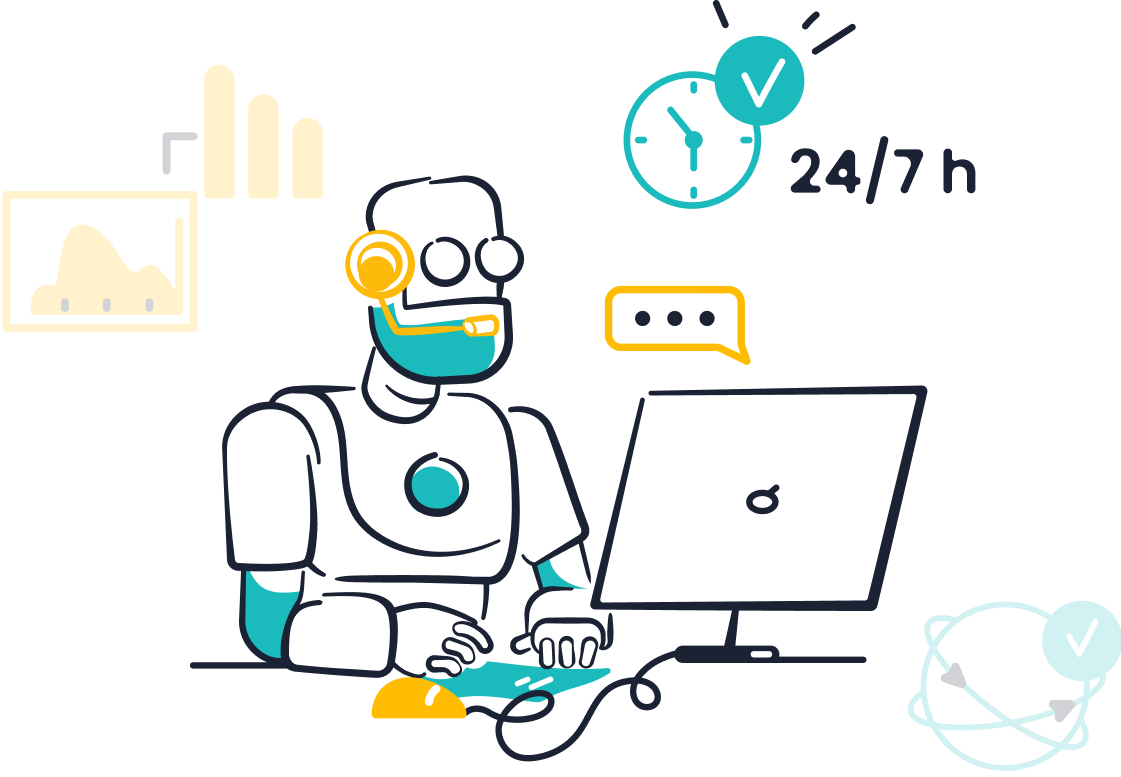
Enterprise chatbot for business solutions are revolutionizing operations in 2025 by enhancing enterprise efficiency and transforming customer engagement. Sobot AI chatbots now power 95% of customer interactions, while 80% of organizations leverage Sobot’s enterprise chatbot for business to automate support and accelerate response times. Leading the industry, Sobot offers advanced conversational AI and omnichannel chatbot solutions that provide hyper-personalization and real-time assistance. Businesses utilizing Sobot AI experience up to 40% more revenue through AI-driven personalization, and 88% of clients return when omnichannel chatbots meet their expectations. With Sobot AI’s seamless integration across multiple channels, organizations can significantly improve customer satisfaction and operational performance.
| Aspect | Statistic / Impact | Outcome |
|---|---|---|
| AI in Customer Interactions | 95% of customer interactions powered by Sobot AI by 2025 | Enhanced efficiency and superior support quality |
| Chatbot Adoption | 80% adoption rate of Sobot enterprise chatbot for business among organizations | Reduced costs and faster response times |
| AI-driven Personalization | Up to 40% more revenue for fast-growing businesses using Sobot AI | Significant acceleration in business growth |
| Customer Retention with Omnichannel | 88% of clients return when Sobot’s omnichannel chatbot expectations are met | Increased loyalty and repeat business |
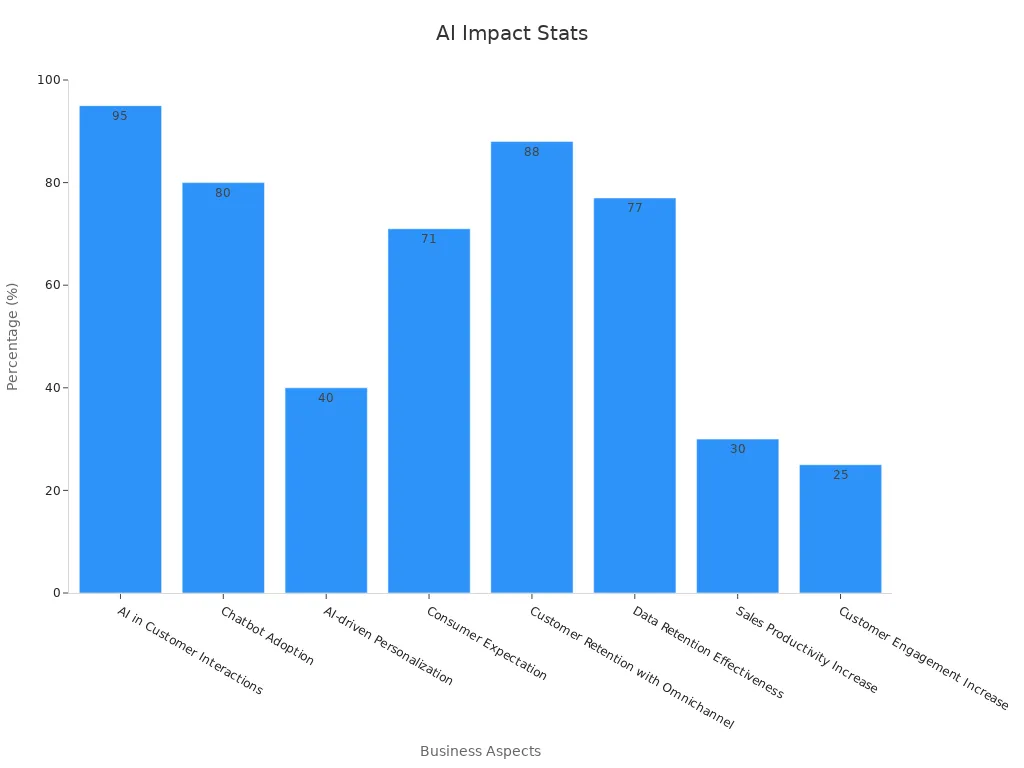
Enterprise Chatbot for Business Overview
What Is an Enterprise Chatbot?
An enterprise chatbot for business is a conversational AI tool that automates and streamlines tasks across departments in large organizations. Unlike basic chatbots, these advanced systems connect with CRMs, ERPs, and internal data sources. They offer strong security compliance, such as GDPR and SOC 2, and support custom integrations for various business needs. According to Grand View Research, the global chatbot market reached $7.76 billion in 2024 and is expected to grow to $27.29 billion by 2030. This growth highlights the rising demand for AI-driven solutions in customer support, HR, IT, and sales. Today, 1.4 billion people are open to interacting with chatbots, and 87.2% of users report positive experiences.
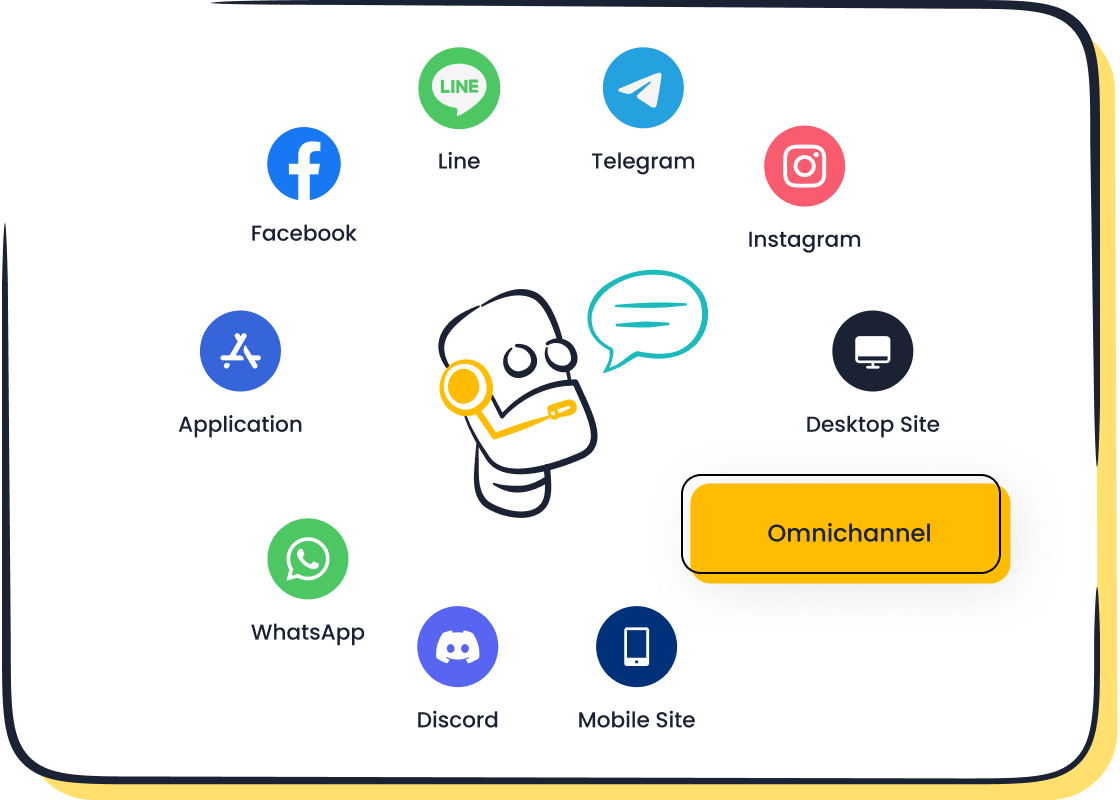
Sobot Chatbot Capabilities
Sobot’s enterprise chatbot for business stands out with its advanced AI features.
- Predictive analytics and deep learning help anticipate customer needs and deliver proactive solutions.
- Seamless CRM integration improves workflow and data connectivity.
- Natural language processing enables the chatbot to understand complex queries.
- The system learns from every customer interaction, improving accuracy over time.
Sobot’s chatbot supports omnichannel communication, including WhatsApp, SMS, and web chat, ensuring businesses can reach customers wherever they are. These capabilities allow Sobot to move beyond reactive support and deliver proactive, personalized experiences.
Role in Customer Contact
Enterprise chatbots play a vital role in modern customer contact strategies.
- They handle high volumes of customer interactions efficiently, providing 24/7 support and instant query resolution.
- Automation reduces operational costs and allows human agents to focus on complex issues.
- Omnichannel integration ensures consistent experiences across platforms like WhatsApp Business API, SMS, and social media.
- AI-powered chatbots automate lead qualification and nurturing, boosting sales conversions.
- Data-driven insights from chatbot interactions help businesses refine engagement strategies.
Sobot’s enterprise chatbot for business empowers organizations to deliver fast, accurate, and personalized customer support, enhancing satisfaction and loyalty.
Key Trends Shaping the Future
The future of chatbots is defined by rapid advancements in AI, conversational AI, and automation. Businesses now rely on advanced chatbots to deliver seamless, personalized, and efficient customer experiences. Sobot leads this transformation with AI-powered tools that support multilingual communication, 24/7 operation, and integration across channels like WhatsApp and SMS. The following key trends shaping the future highlight how AI chatbot automation is enhancing customer interaction and driving business growth.
Voice and Multimodal Chatbots
Voice and multimodal chatbots represent a major leap in enhancing customer interaction. These AI chatbots combine text, voice, images, and even video to create richer, more engaging conversations. Sobot’s AI chatbot for businesses leverages these capabilities to provide instant support and intuitive experiences across devices.
Multimodal chatbots increase engagement and retention by allowing users to interact through their preferred channels.
| Interaction Type | Retention | Conversation Length | User Utterance Length |
|---|---|---|---|
| Text-only | 0.105 | 15.77 | 13.01 |
| Multimodal (images, audio) | 0.139 | 28.97 | 13.16 |
| Text-audio Alignment | 0.261 | 51.53 | 29.55 |
This table shows that multimodal interactions significantly improve retention and conversation length compared to text-only chatbots. Real-world examples include Walmart’s voice-enabled grocery ordering and Hilton Hotels’ voice-controlled room features. These trends demonstrate that voice and multimodal chatbots are essential for the future of chatbots, especially in sectors like retail and hospitality.
Industry analysis confirms this direction. Microsoft 365 Copilot users report a 70% productivity boost, while GitHub Copilot users complete work 88% faster. The global market for conversational AI and voice assistants continues to expand, with North America leading revenue share and Asia Pacific showing the highest growth rate.
Emotional Intelligence
Emotional intelligence in chatbots is transforming how businesses connect with customers. AI-powered tools now detect and respond to emotions, making conversations feel more human. Sobot’s advanced chatbots use sentiment analysis and natural language processing to recognize customer moods and adjust responses accordingly.
A recent psychological survey in e-commerce found that trust and enjoyment play a key role in chatbot adoption. Users who enjoy interacting with emotionally aware chatbots are more likely to trust and use them. Another study with over 700 participants showed that chatbots expressing emotions through text, emoticons, and images significantly enhance perceived humanness and social interactivity.
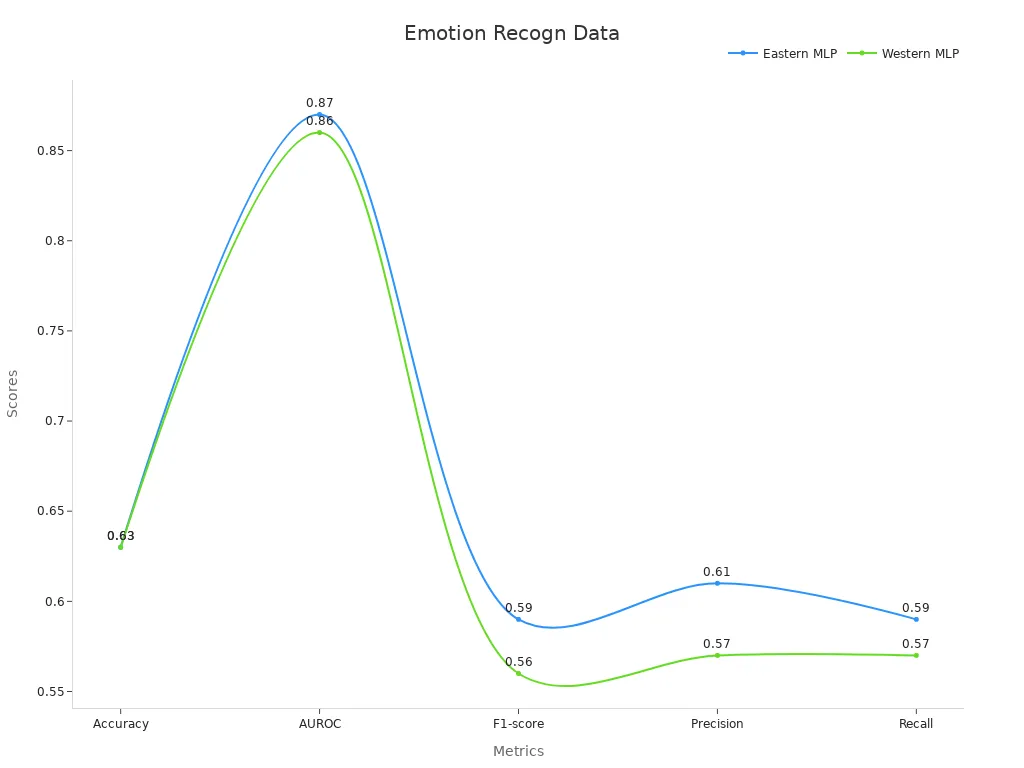
This chart highlights the effectiveness of emotion recognition in chatbot conversations across different user groups. As AI chatbot trends evolve, emotional intelligence will remain a cornerstone for enhancing customer interaction and satisfaction.
Hyper-Personalization
Hyper-personalization stands at the forefront of AI chatbot trends. AI chatbots now analyze customer data, preferences, and behaviors to deliver tailored recommendations and support. Sobot’s AI chatbot for businesses uses predictive analytics and real-time intent detection to offer personalized experiences that drive loyalty and conversions.
- 71% of consumers expect personalized interactions.
- 80% of business leaders report that personalization increases customer spending by an average of 38%.
- Hyper-personalization can deliver up to 800% ROI on marketing spend.
Retailers like Amazon and Stitch Fix use hyper-personalization to boost loyalty and repeat business. Sobot’s advanced chatbots help businesses achieve similar results by integrating with CRM systems and leveraging AI-powered tools for targeted messaging. This trend is critical for the future of chatbots, as customers demand more relevant and meaningful interactions.
Omnichannel Integration
Omnichannel integration is a defining feature of modern AI chatbot automation. Businesses must engage customers across websites, mobile apps, messaging platforms, and social media. Sobot’s AI chatbots unify these channels, ensuring consistent and real-time support.
- Omnichannel chatbots reduce first-level support tickets by 75% and cut response times from 18 minutes to under 1 minute.
- Customer satisfaction scores increase by 35% within three months of deployment.
- Support costs drop by 40% due to automation and efficient routing.
Sobot’s omnichannel platform integrates with WhatsApp, SMS, and other popular channels, providing seamless customer journeys. The system collects and analyzes interaction data, generating insights that help businesses refine their strategies. As AI chatbot trends continue to evolve, omnichannel integration will remain essential for enhancing customer interaction and maintaining a competitive edge.
The key trends shaping the future of chatbots—voice and multimodal capabilities, emotional intelligence, hyper-personalization, and omnichannel integration—are redefining how businesses use AI-powered tools to support and engage customers. Sobot’s commitment to innovation ensures that organizations stay ahead in the rapidly changing landscape of conversational AI.
AI Chatbot for Businesses in Action

Customer Service Automation
AI chatbot automation is transforming customer service for businesses worldwide. Companies now use chatbots to handle routine inquiries, FAQs, and basic troubleshooting. This automation frees human agents to focus on complex issues and improves overall efficiency. Features like drag-and-drop chatbot builders and natural language processing allow advanced chatbots to understand customer needs quickly.
| Company / Example | AI Chatbot Implementation Details | Performance Metrics / Outcomes |
|---|---|---|
| Klarna | AI chatbot operating 24/7 in 23 markets, supporting 35+ languages | Reduced average query resolution time from 11 minutes to under 2 minutes; 25% reduction in repeat inquiries; $40 million profit improvement in 2024 |
| Motel Rocks | Used AI chatbots to manage inquiries and sense customer mood | Enabled customer self-service; Allowed agents to focus on complex queries |
| XYZ Corporation | AI chatbots deployed on website and social media | Instant answers to common questions; Improved customer experience |
Sobot’s ai chatbot for businesses delivers 24/7 support, faster response times, and improved customer satisfaction. Businesses see a 60% reduction in agent workload and a 35% improvement in Net Promoter Score (NPS). Automation also ensures scalability and cost efficiency as customer volumes grow.
Ecommerce and Retail Solutions
AI chatbots drive business growth in ecommerce and retail by increasing conversions and streamlining support. These chatbots engage customers with personalized recommendations, answer product questions, and guide users through the buying process. Sobot’s advanced chatbots integrate with CRM systems to deliver targeted promotions and real-time assistance.
| Metric | Value | Description |
|---|---|---|
| Conversion rate uplift | 23% | Increase in conversion rates for online retailers after AI chatbot implementation. |
| Reduction in support tickets | 60% | Decrease in customer support tickets within three months of chatbot deployment. |
| Rise in total sales | 30% | Growth in total sales reported by a global ecommerce platform after chatbot integration. |
| Increase in mobile conversions | 40% | Growth in conversions specifically on mobile devices. |
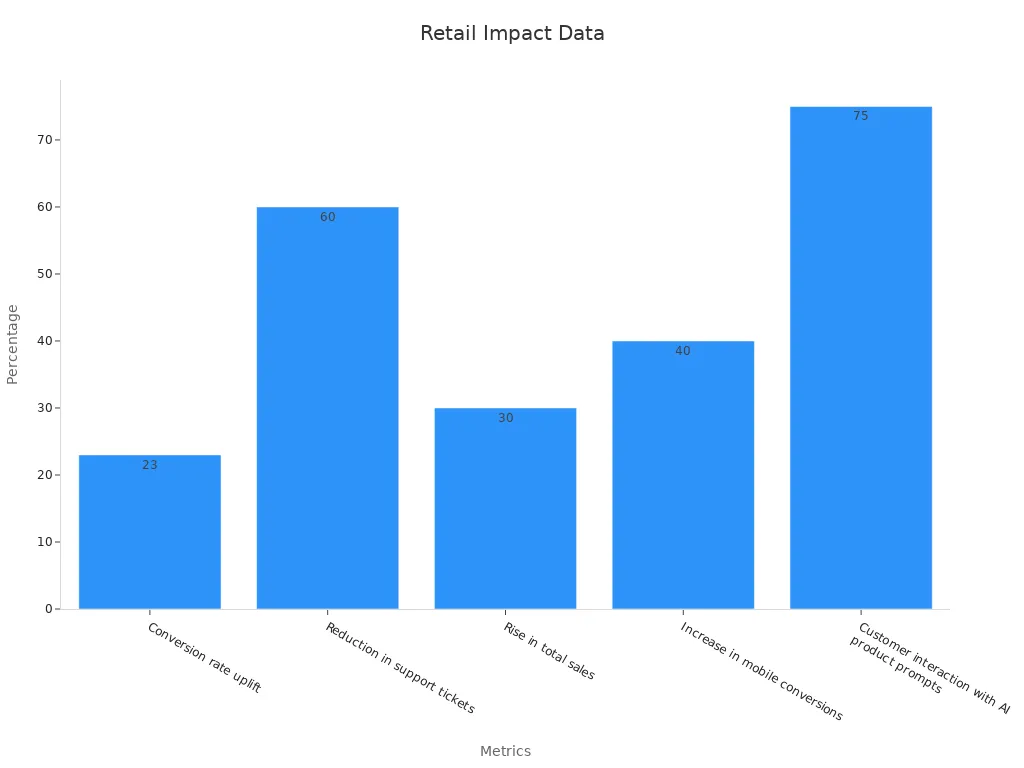
Sobot’s ai chatbot for businesses helps retailers convert 28% of website visitors into leads and supports omnichannel engagement across web, mobile, and messaging apps. This automation leads to higher sales and better customer experiences.
Sobot Customer Success Story: OPPO
OPPO, a global leader in smart devices, partnered with Sobot to enhance customer service. During peak shopping periods, OPPO faced high inquiry volumes and needed efficient automation. Sobot’s chatbot and ticketing system enabled OPPO to automate repetitive queries and optimize its knowledge base.
OPPO achieved an 83% chatbot resolution rate, a 94% positive feedback rate, and a 57% increase in repurchase rate after deploying Sobot’s solutions.
Sobot integrated OPPO’s customer channels and business systems, improving data accessibility and agent productivity. The result was a 93% customer satisfaction score and faster response times. This partnership demonstrates how ai chatbots and automation drive business growth, reduce costs, and elevate customer support.
Benefits of Chatbots
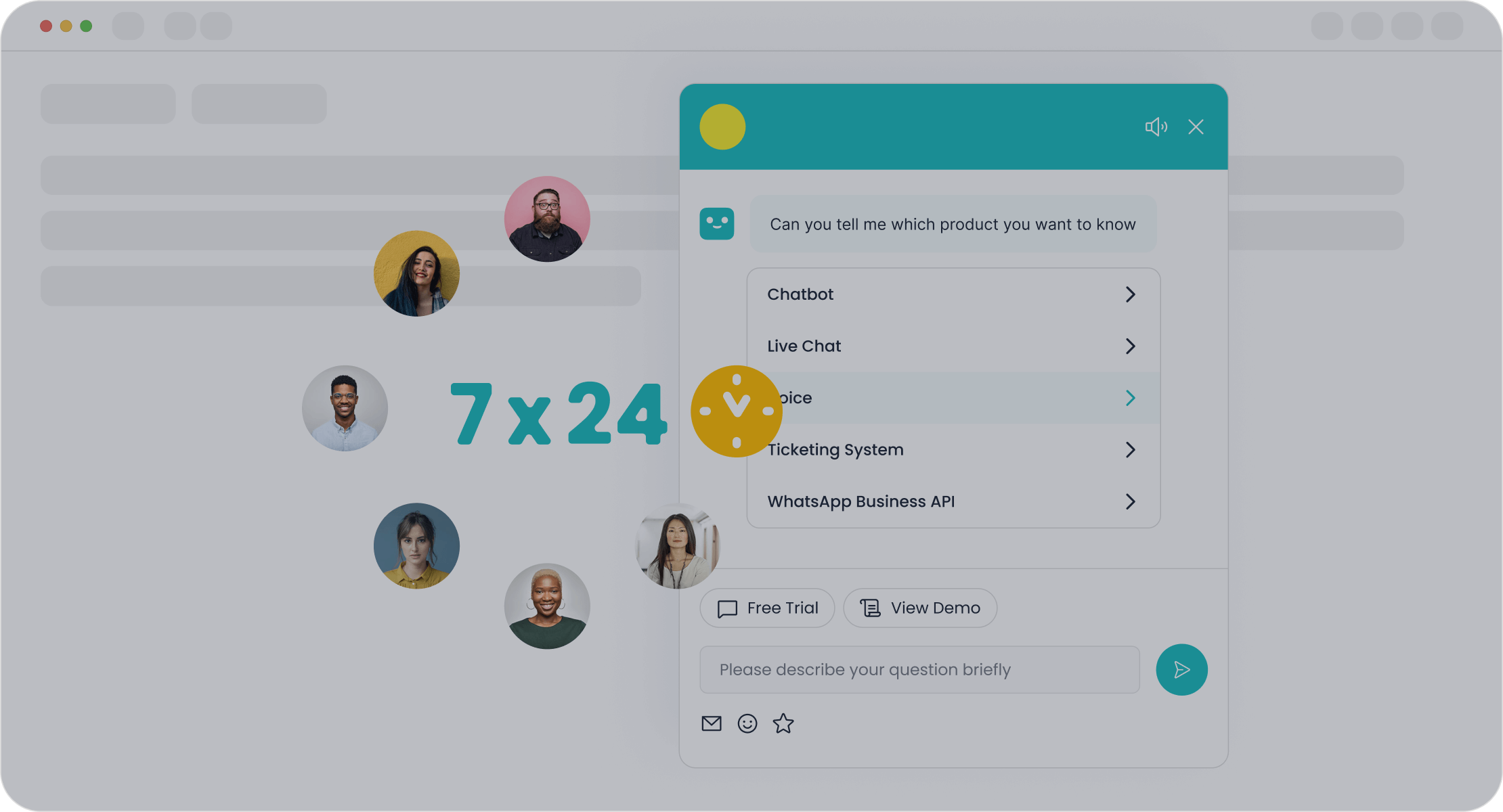
Cost Savings
Businesses achieve significant cost savings by deploying chatbots. These AI-powered tools automate 60-80% of routine customer queries, which reduces the need for human agents. Companies report up to a 30% reduction in support costs within six months. For example, TechStyle Fashion Group saved $1.1 million in operational expenses in the first year after implementing AI chatbots. Klarna’s chatbot solution led to an estimated $40 million annual profit impact by handling millions of inquiries monthly and reducing repeat inquiries by 25%. Direct savings come from lower labor costs, while indirect benefits include improved customer satisfaction and increased sales conversion. The typical ROI for enterprise chatbots ranges from 200% to 800%, with many organizations seeing positive returns within a year.
- Annual ROI is calculated as (net savings minus chatbot costs) divided by chatbot costs, multiplied by 100.
- AI chatbots can save $1.31 per query by handling 80% of routine inquiries.
- Health insurers like NIB saved $22 million and reduced human support by 60% using digital assistants.
Scalability
Chatbots offer unmatched scalability for growing businesses. They handle large volumes of customer interactions across multiple channels without increasing operational costs. Since 2019, chatbot usage has grown by 92%, making it the fastest-growing brand communication channel. Approximately 1.4 billion people are open to interacting with chatbots, and 70% of daily customer support is now managed by these AI solutions. Companies in sectors such as healthcare and finance report that chatbots handle up to 90% of inquiries.
| Metric / Trend | Statistic / Insight |
|---|---|
| Usage increase since 2019 | 92% growth |
| Customer support handled by chatbots | 70% of daily interactions |
| Labor hours saved annually | 2.5 billion hours |
| Annual cost savings | $11 billion |
| Market growth projection | $137.6M (2023) to $454.8M (2027) |
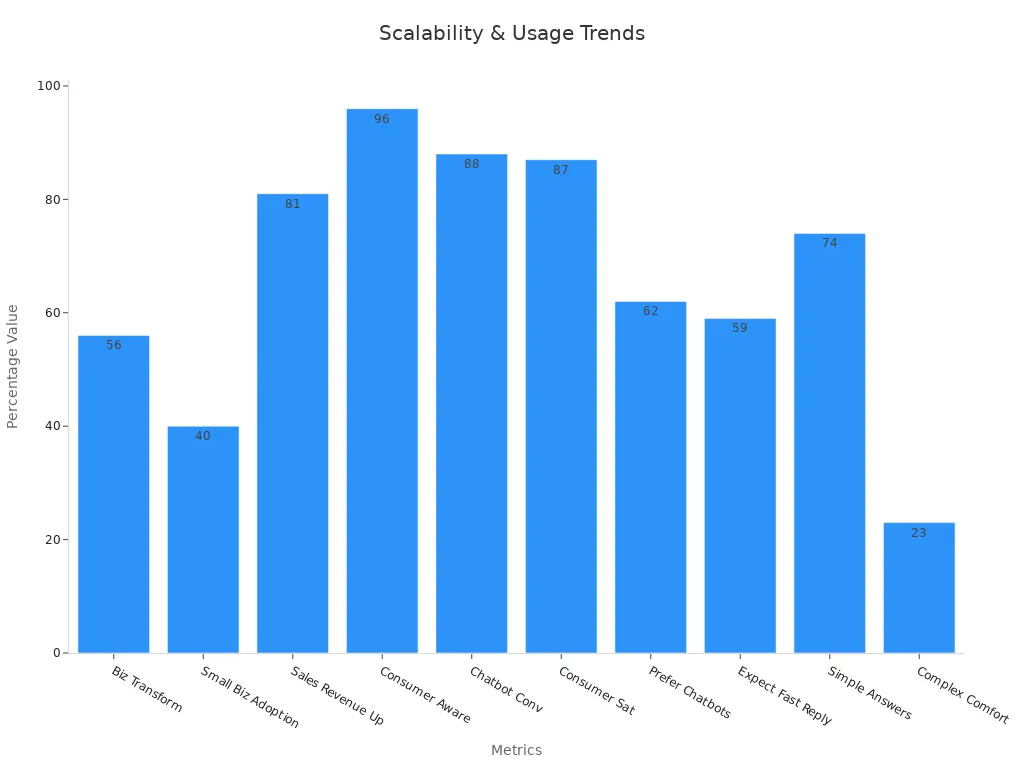
Sobot’s AI chatbots support omnichannel integration, allowing businesses to scale customer interaction across web, mobile, and messaging platforms efficiently.
Enhanced Customer Experience
AI chatbots play a vital role in enhancing customer interaction and shaping a strong customer experience strategy. These tools use sentiment analysis to detect emotional tone and respond empathetically. Chatbots prompt users for feedback after key interactions, ensuring timely and relevant insights. Gamification and multimodal feedback options, such as voice and screenshots, encourage more customers to share their experiences. Real-time feedback collection allows businesses to resolve issues quickly and identify satisfied users as brand advocates. Sobot’s chatbots personalize survey questions based on user behavior, increasing engagement and satisfaction.
- Chatbots collect both qualitative and quantitative feedback in a conversational format.
- Sentiment analysis enables timely responses to negative feedback.
- Continuous feedback loops drive product improvements and customer satisfaction.
Data-Driven Insights
Chatbots generate valuable data-driven insights that help businesses optimize operations and improve customer experience. By tracking metrics such as conversation volume, user engagement, conversion rates, and satisfaction scores, companies gain a clear view of performance. For instance, chatbots with high conversation completion rates deliver three times more conversions. AI-powered analytics identify drop-off points and reasons for disengagement, enabling businesses to refine conversation flows. Integration with platforms like CRM and business intelligence systems creates a unified view of customer data, supporting strategic decisions.
| Metric Category | Key Metrics | Business Impact |
|---|---|---|
| Conversation Volume | Total sessions, peak usage times | Resource planning, usage patterns |
| User Engagement | Completion rate, messages per session | Optimizes conversation design |
| Conversion | Goal completion, lead generation | Measures ROI, increases revenue |
| User Satisfaction | CSAT, NPS, explicit feedback | Assesses quality of customer experience |
| Operational Efficiency | Response time, resolution rates | Reduces costs, improves processes |
Sobot’s AI chatbots provide actionable insights, empowering businesses to make data-driven decisions and maintain a competitive edge.
Challenges and Best Practices
Integration and Security
Businesses face several challenges when integrating chatbots into existing systems. Data privacy, compatibility with legacy infrastructure, and regulatory compliance remain top concerns. AI chatbots must synchronize with databases and workflows, often requiring middleware for seamless integration. Security benchmarks recommend end-to-end encryption, role-based access controls, and regular audits. GDPR and HIPAA demand explicit user consent, secure storage, and transparent data practices. Companies should conduct vendor assessments, maintain encrypted backups, and implement disaster recovery plans. Regular penetration testing and code reviews help prevent data leakage. Sobot’s platform supports compliance with global standards, offering robust security and privacy features for customer data.
Tip: Use multi-factor authentication and continuous monitoring to protect sensitive information and ensure regulatory compliance.
User Adoption
User adoption depends on trust, satisfaction, and ease of use. Studies show that 64% of people trust AI chatbots, and 60% of consumers say chatbots influence their purchasing decisions. Trust and satisfaction drive long-term usage, especially when chatbots provide reliable automation and support. Sobot’s onboarding resources help businesses train staff and users, making adoption smoother. Best practices include clear communication about data usage, user training to recognize security threats, and regular feedback collection. Companies should monitor activation rates and retention to identify adoption barriers and optimize the onboarding process.
Measuring Success
Measuring chatbot success requires a mix of quantitative and qualitative metrics. Key performance indicators include user adoption rates, response times, goal completion, and customer satisfaction scores. The table below outlines essential metrics for evaluating AI chatbot effectiveness:
| Metric Category | Key Metrics / KPIs | Responsible Team |
|---|---|---|
| User Adoption | New conversations, activation rate, retention | Marketing/Support |
| Performance | Response time, intent accuracy, fallback rate | Technical/Data Science |
| Business Value | Goal completion, satisfaction, ticket deflection | Product/Executive |
Continuous optimization involves analyzing chat logs, retraining AI models, and updating knowledge bases. Sobot provides centralized dashboards and real-time alerts, supporting ongoing improvement and high ROI.
Future of Chatbots: Next Steps
Adopting Sobot Solutions
Organizations planning for the future of chatbots should follow a structured approach to ensure successful adoption and business growth. Sobot offers a scalable platform that adapts to changing needs and supports long-term growth. Companies can use these steps to guide their implementation:
- Select a scalable AI chatbot platform like Sobot to support future growth and flexibility.
- Integrate the chatbot with existing CRM systems to maximize customer data and streamline workflows.
- Train employees to work alongside AI, ensuring smooth collaboration and higher productivity.
- Continuously retrain AI models with new data to improve chatbot performance and accuracy.
- Set up clear escalation paths for complex or unresolved customer issues.
Sobot’s multilingual support and self-learning AI features help businesses expand globally and improve service quality. These steps prepare organizations for the future of chatbots and drive sustainable business growth.
Tip: Regularly review chatbot performance metrics to identify areas for improvement and maintain high service standards.
Staying Ahead with Innovation
The future of chatbots depends on continuous innovation and adaptation. Sobot encourages businesses to track key metrics and trends to stay competitive:
- User engagement rates show how often customers interact with chatbots.
- Customer satisfaction scores reveal how well chatbots resolve issues.
- Fast response times improve user experience and build trust.
- Conversation path analysis highlights user pain points for better chatbot design.
- Usage trends and predictive analytics help anticipate customer needs and support growth.
Advancements in natural language processing, emotion recognition, and multilingual support shape the future of chatbots. Sobot’s integration with CRM and social media tools streamlines support and boosts efficiency. Ethical practices, such as transparency and data privacy, remain essential for building trust.
Note: Businesses that embrace innovation and monitor chatbot trends will lead in customer engagement and operational excellence.
Enterprise chatbots now drive business success by automating support, improving efficiency, and delivering better customer experiences. Sobot’s solutions help companies achieve up to 94% positive feedback and a 57% increase in repurchase rates, as seen with OPPO. AI-driven, omnichannel, and personalized chatbot technologies allow organizations to meet rising customer expectations. Companies that embrace these advancements will stay ahead in a fast-changing digital world.
FAQ
What industries benefit most from enterprise chatbots?
Retail, finance, gaming, and education see the greatest impact. Sobot’s AI chatbots help these sectors automate support, boost sales, and improve customer satisfaction. For example, OPPO increased its repurchase rate by 57% after deploying Sobot’s solution.
How do chatbots improve customer service efficiency?
Chatbots handle up to 80% of routine queries instantly. Sobot’s AI chatbot operates 24/7, reducing agent workload by 60%. This leads to faster response times and higher customer satisfaction scores.
Are Sobot chatbots secure and compliant?
Yes. Sobot chatbots follow strict security protocols, including GDPR compliance, data encryption, and regular audits. These measures protect customer data and ensure regulatory standards are met.
What are the market growth projections for enterprise chatbots?
According to Grand View Research, the global chatbot market will reach $27.29 billion by 2030. This rapid growth reflects increasing adoption across industries and rising demand for AI-driven automation.
Can Sobot chatbots integrate with existing business systems?
Sobot chatbots connect seamlessly with CRM, ERP, and communication platforms. The integration process uses a point-and-click interface, making deployment fast and easy for businesses of any size.
See Also
Simple Steps To Add Chatbots On Your Website
Ways Chatbots Enhance Customer Experience In E-commerce
Building Effective Chatbots To Drive Website Growth
